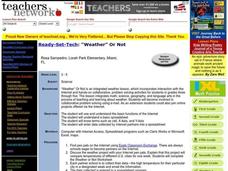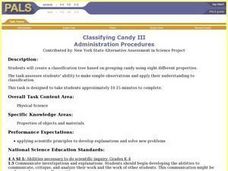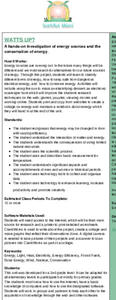Curated OER
Vitamin C Testing
Students determine which of three beverage samples contains the most vitamin C. They then apply their knowledge to an additional situation. Students use beverages that have a large, definite difference of vitamin C content to...
Curated OER
Campus Nitrogen Budget
Students are given guidelines to college level nitrogen budgeting. Students brainstorm the campus links to nitrogen budget. Students pick topics or subtopics for individual or group research. Students develop research plan, keep good...
Curated OER
Let's Play Some Ball!
Pupils review horizontal and vertical shifts of a parabola and how they effect a specific quadratic formula. They play a basketball review game in which they try to find the right quadratic equation for a given problem in order to earn...
Alabama Learning Exchange
I Will Survive
Young scholars explore animal adaptations. In this animal science lesson, students watch the video "Kratt's Kreatures" and work in groups to complete a worksheet about animal adaptations.
Curated OER
Nature of Science and Ecology
Young scholars identify the different biotic and abiotic components of an ecosystem. In this ecology lesson, students perform a case study on current environmental problems. They write a position statement about their chosen topic and...
Curated OER
Weather Or Not
Students use the internet to find pen pals to share in their weather experiment. Individually, they research the high and low temperatures for cities within the United States and email the results to their pen pal. They also develop a...
Curated OER
Create Your Own Investigation
Middle schoolers design and implement an experiment intended to measure and analyze the air quality of a particular location. They focus on looking for ozone and particulate pollutants.
Curated OER
Binary Numbers
Students explore how a battery-powered light box demonstrates how to transmi timages.
Curated OER
Exploring the Universe
Students conduct Internet research to find information about each planet and present their findings to the class. Students research statistical information and two interesting facts about each planet, then create a multimedia...
Curated OER
Using Soil properties and Vegetation Differences to Hypothesize the Land Use History and Topographic Differences between Two Locations
Ninth graders take soil samples and perform tests on these samples.
Curated OER
Don't oZone Out
Students study the ozone and measure its concentration in different areas. Students use Ecobadge strips and other equipement for measurement. Then they share their results on an on-line forum. Also, students study environmental problems.
Curated OER
Habitat Is Home
Young scholars are introduced to the concept and components of a habitat. They discuss the key components of a habitat and describe how certain factors can cause disturbances in a habitat and change its population. Activities are leveled...
Curated OER
H2O in Us
Students discover through this activity that all organisms are composed of water. They find that 70 percent of their bodies are made up of water that is in thier cells and blood, and not free-flowing throughout their body.
Curated OER
Calculating the Average Mass of the Newly Discovered Element: Bean
Young scholars determine the average mass of a new element using masses from three isotopes. In this chemistry lesson, students explain what an isotope is. They discuss their importance and uses.
Curated OER
Presentation of Findings
Young scholars compile and format their findings from the worm bins, the plant activity, and their Internet research on related topics into scrapbooks.
Curated OER
Home on the Biome
Fifth graders study six major biomes, graph temperature and rainfall, and present their findings to the class.
Curated OER
Standards And Science
Students study how standards are established in Science. They also look at the value of different perspectives with questions about ecological standards. The class creates its own standards for ecology with the help of a survey to obtain...
Curated OER
Global Symposium
Ninth graders work together to develop a sysnopis on the Earth. Using the Internet and print sources, they focus on one country to research and determine its condition. They offer possible solutions to the problem and share their...
Curated OER
Designing a Scientific Study
Students define an exploration question or hypothesis and design a scientific study to answer it. They conduct the experiment.
Curated OER
Classifying Candy III
Students create a classification tree based on grouping candy with eight different properties. This allows students to understand how living things are classified.
Curated OER
Graphing Speed
Young scholars use LOGAL motion detector probe and observe a generated graph as a student performs various standard motions, and make measurements of time and distance. They suggest various time and distance measurements which a student...
Curated OER
WATTS UP?
Second graders research the Internet as they classify different forms of energy, investigate electrical energy and how to conserve energy.
Curated OER
State Your Position
Students practice using a global positioning system. They discuss the use of celestial objects as navigation points and its problems. They list the advantages and disadvantages of GPS as well.
Curated OER
Discovering the Oasis
Students focus on the types of vegetation and animal life living around local water sources. This lesson can be adapted to any local water source, whether it be a lake, a river, stream or ocean. It has a particular focus on the bird...

























